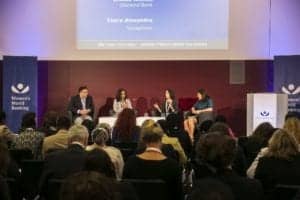“This panel is all about disruption,” said Women’s World Banking President and CEO Mary Ellen Iskenderian as she opened the “Who are the Game Changers in Financial Inclusion for Women?” plenary session at our Making Finance Work for Women Summit. The panel featured Claire Alexandre, Head of Commercial and Strategy for Mobile Payments at Vodafone, Sunil Sachdev, Chief Business Development Officer for GlobeOne, and Aishah Ahmad, Head of Consumer and Privilege Banking at Nigeria’s Diamond Bank. Collectively they are indeed disruptors, challenging longstanding financial service business models in order to reach historically unbanked low-income clients.
At Diamond Bank, one of the largest commercial banks in Nigeria, Aishah Ahmad leads a team working to reach the more than 56 million unbanked Nigerians. As the financial community increasingly looks to mobile and digital services to reach underserved communities, Aishah warns us not to write off the banks just yet. “We’re a retail bank using technology to drive financial inclusion and innovative customer experiences,” she said. “Our goal is to reduce the cost of serving low-income customers, making them more commercially viable.”
Claire Alexandre shared how Vodafone and other mobile network operators are disrupting the system to add to what banks can offer clients—mobile payment transactions through services like M-Pesa—and also to support traditional bank offerings such as savings and loans. M-Pesa has 23.4 million active customers globally. Claire emphasized these customers are active users, meaning they are using the service more than once per month. “For many, this is a first step toward formal financial services. When we talk about financial inclusion, we’re talking about usage, not just access.”
At GlobeOne, a FinTech company that provides a platform for a global community of banks, corporations and individuals, Sunil Sachdev is advocating for an inclusive global financial ecosystem that connects actors across traditional sector lines. “It’s less about technology,” said Sunil. “Those services and solutions are plentiful. What’s missing is the ability to leverage that technology with the right business model and the right partners.”
We saw nods of agreement across the panel about the critical role of partnerships in reaching full financial inclusion.
“Partnerships work when incentives are aligned,” said Claire. This is even true when financial inclusion is the incentive. “We need to ensure that everyone is bringing something to the table and is rewarded.”
Aishah agreed: “It’s about us trying to work together with regulators, MNOs, FinTech. How can we work together to drive financial inclusion?”

The panelists agreed that regulators in particular have an enormous opportunity to help facilitate such innovative partnerships. Aishah highlighted recent changes to the tiers of banks’ Know Your Customer (KYC) requirements made by the Central Bank of Nigeria (CBN) as an example of a regulator creating more favorable environments for reaching the unbanked. “Today, you can open a bank account simply with a photograph, which can be taken by phone. The tiers change based on the size of the transactions and account balances. That has opened up all the possibilities,” said Aishah – especially for women, who often do not have formal identification. Still, she says, regulators can play a stronger role in financial inclusion. “I’d like to see the CBN put more weight on financial inclusion. […] How can we incentivize banks to take financial services to everyone through regulation?”
Of course, the disruptions to traditional banking models discussed throughout this panel are particularly critical for reaching low-income women clients. Mary Ellen asked the panelists how their approaches are helping to close the gender gap in financial inclusion.
“We need to understand why women are excluded then find ways of fixing that,” said Aishah. Diamond Bank has partnered with Women’s World Banking to tackle this very task, resulting in the creation of BETA Savings, a savings account designed for women who run stalls in open-air markets. Our client research found that women in these markets did not have formal savings accounts for a variety of reasons, including limited time to visit banks, long distances to branches and also feeling that formal banks just weren’t for them. BETA Savings addresses those obstacles by employing agents, knowns as BETA Friends, to visit a client’s business to open accounts digitally and handle transactions using mobile technology. The account not only helps women overcome longstanding barriers, but also offers a first point of access to the formal economy.
Many of M-Pesa’s services also have particular relevance for women, including remittances, for which women are the primary recipients. Another program specifically targets women affected by fistulas after childbirth in Tanzania. M-Pesa enables payment for transport to clinics as well as long-distance payment transactions through mobile phones. “We tend to really focus on what the customer needs. […] If you’re not serving a need, don’t expect them to come,” said Claire. “We need to start to do even more segmentation focused on women.”
While Vodafone, GlobeOne and Diamond Bank take different approaches to increasing access to financial services for low-income women, the critical role of disruptors like those who joined this panel in reaching full financial inclusion is irrefutable.
To watch the full panel on “Who are the Game Changers in Financial Inclusion for Women?” check out the video here.




